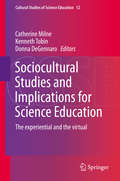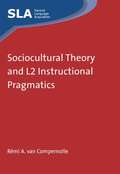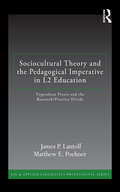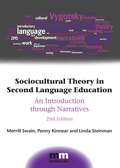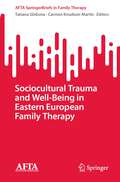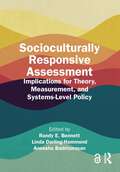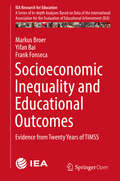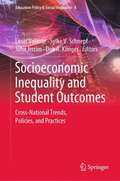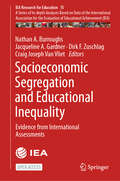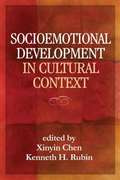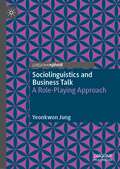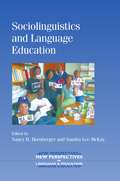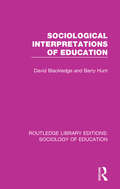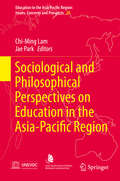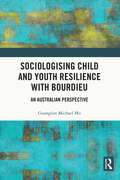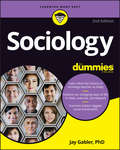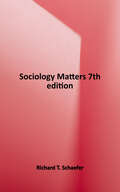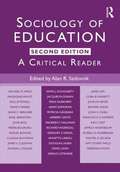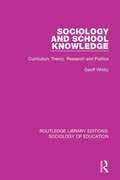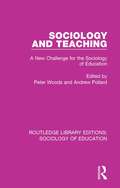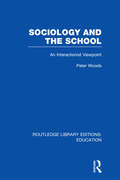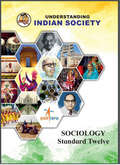- Table View
- List View
Sociocultural Studies and Implications for Science Education
by Kenneth Tobin Catherine Milne Donna DegennaroThe chapters included in this book address two major questions: what are some of the methodological and theoretical issues in sociocultural research in urban education and science education and what sort of questions do technological and virtual contexts raise for these types of research perspectives. The chapters build off Ken Tobin's personal history of sociocultural research in science education and as they do each chapter asks philosophical, sociological and/or methodological questions that inform our understanding of the challenges associated with conducting research in experiential and virtual contexts.
Sociocultural Theory and L2 Instructional Pragmatics
by Rémi A. van CompernolleThe book outlines a framework for teaching second language pragmatics grounded in Vygotskian sociocultural psychology. The framework focuses on the appropriation of sociopragmatic concepts as psychological tools that mediate pragmalinguistic choices. Using multiple sources of metalinguistic and performance data collected during a six-week pedagogical enrichment program involving one-on-one tutoring sessions, the volume explores both theoretical and practical issues relevant to teaching second language pragmatics from a Vygotskian perspective. The book represents an important contribution to second language instructional pragmatics research as well as to second language sociocultural psychology scholarship. It will be of interest to all those researching in this field and to language teachers who will find the pedagogical recommendations useful.
Sociocultural Theory and the Pedagogical Imperative in L2 Education: Vygotskian Praxis and the Research/Practice Divide (ESL & Applied Linguistics Professional Series)
by James P. Lantolf Matthew E. PoehnerExplicating clearly and concisely the full implication of a praxis-oriented language pedagogy, this book argues for an approach to language teaching grounded in a significant scientific theory of human learning—a stance that rejects the consumer approach to theory and the dichotomy between theory and practice that dominates SLA and language teaching. This approach is based on Vygotsky’s sociocultural theory, according to which the two activities are inherently connected so that each is necessarily rooted in the other; practice is the research laboratory where the theory is tested. From the perspective of language education, this is what is meant by the ‘pedagogical imperative.’ Sociocultural Theory and the Pedagogical Imperative in L2 Education• Elaborates a new approach to dealing with the relationship between theory and practice—an approach grounded in praxis—the dialectical unity of theory and practice• Presents an analysis of empirical research illustrating praxis-based principles in real language classrooms • Brings together cognitive linguistics and sociocultural theory ─ the former provides the theoretical knowledge of language required of praxis and the latter furnishes the theoretical principles of learning and development also called for in a praxis approach• Offers recommendations for redesigning teacher education programs Its timely focus on the theory-practice gap in language education and its original approach to bridging it put this book at the cutting edge of thinking about Vygotskian sociocultural theory in applied linguistics and SLA.
Sociocultural Theory in Second Language Education
by Merrill Swain Penny KinnearIn this accessible introduction to Vygotskyian sociocultural theory, narratives illuminate key concepts of the theory. These key concepts, addressed across seven chapters, include mediation; Zone of Proximal Development; collaborative dialogue; private speech; everyday and scientific concepts; the interrelatedness of cognition and emotion, activity theory and assessment. An eighth chapter provides readers with an opportunity to consider two additional narratives and apply the SCT concepts that they have become familiar with. These narratives come from individuals in a variety of languages, contexts, ages and proficiencies. We hear from learners, teachers and researchers. Intended for graduate and undergraduate audiences, this textbook includes controversies in the field, questions for collaborative discussion and provides references to important work in the literature of second language teaching, learning and research.
Sociocultural Trauma and Well-Being in Eastern European Family Therapy (AFTA SpringerBriefs in Family Therapy)
by Carmen Knudson-Martin Tatiana GlebovaThis book examines the effects of sociocultural trauma throughout the 20th century on interpersonal and family relationships in five Eastern European countries, drawing on the perspectives of mental health practitioners. Chapters employ a systemic perspective to explore the unique social, political, and cultural contexts that influence relationships in each country with a particular focus on implications for psychological and relational well-being. The volume demonstrates the importance of examining the cultural and sociocontextual nuances and complexity that may influence the impact of historical events on relationships, elucidating similarities and differences among countries in how the collective trauma has influenced them. It assists family therapists and other mental health practitioners in recognizing cultural and social factors that may influence their work with families, individuals, or couples living in these countries or who have immigrated from them.Key areas of coverage include:Descriptions of each country’s experience of sociocultural trauma and the current social-cultural-economic-political contexts.Impact of trauma on interpersonal relationships across various social locations and national and ethnic identities within the existing borders.Current challenges, recommendations for clinical practice, and future directions for research and practice. Sociocultural Trauma and Well-Being in Eastern European Family Therapy is an essential resource for clinicians, therapists, and practitioners as well as researchers, professors, and graduate students in family studies, clinical psychology, and public health as well as all interrelated disciplines.
Socioculturally Responsive Assessment: Implications for Theory, Measurement, and Systems-Level Policy
by Linda Darling-Hammond Randy E. Bennett Aneesha BadrinarayanSocioculturally Responsive Assessment assembles the best-available thinking from within and outside the educational measurement community about the theoretical foundations and systems-level policy implications of formal assessment programs designed to be socioculturally responsive. Synthesized from culturally responsive assessment design and practices, culturally relevant pedagogy and funds of knowledge, universal design for learning, the learning sciences, and other literatures, this emerging concept affirms that students’ learning and performance is inextricably tied to the social, cultural, and linguistic contexts in which they live and develop knowledge. Across four sections, this book provides an argument and initial evidence for impact on students, users, and assessment quality; offers guidance for implementation; and examines the potential limitations, pitfalls, barriers, and measurement issues that such programs will inevitably raise. Scholars, teaching faculty, test developers, and policymakers will come away with integral foundations, new assessment approaches, and a greater sense of the potential for positive impact that these assessments may afford.
Socioeconomic Inequality and Educational Outcomes: Evidence from Twenty Years of TIMSS (IEA Research for Education #5)
by Markus Broer Yifan Bai Frank FonsecaThis open access book focuses on trends in educational inequality using twenty years of grade 8 student data collected from 13 education systems by the IEA’s Trends in Mathematics and Science Study (TIMSS) between 1995 and 2015. While the overall positive association between family socioeconomic status (SES) and student achievement is well documented in the literature, the magnitude of this relationship is contingent on social contexts and is expected to vary by education system. Research on how such associations differ across societies and how the strength of these relationships has changed over time is limited. This study, therefore, addresses an important research and policy question by examining changes in the inequality of educational outcomes due to SES over this 20-year period, and also examines the extent to which the performance of students from disadvantaged backgrounds has improved over time in each education system. Education systems generally aim to narrow the achievement gap between low- and high-SES students and to improve the performance of disadvantaged students. However, the lack of quantifiable and comprehensible measures makes it difficult to assess and monitor the effect of such efforts. In this study, a novel measure of SES that is consistent across all TIMSS cycles allows students to be categorized into different socioeconomic groups. This measure of SES may also contribute to future research using TIMSS trend data. Readers will gain new insight into how educational inequality has changed in the education systems studied and how such change may relate to the more complex picture of macroeconomic changes in those societies.
Socioeconomic Inequality and Student Outcomes: Cross-National Trends, Policies, and Practices (Education Policy & Social Inequality #4)
by Louis Volante Sylke V. Schnepf John Jerrim Don A. KlingerThis book examines socioeconomic inequality and student outcomes across various Western industrialized nations and the varying success they have had in addressing achievement gaps in lower socioeconomic status student populations. It presents the national profiles of countries with notable achievement gaps within the respective school-aged student populations, explains the trajectory of achievement results in relation to both national and international large-scale assessment measures, and discusses how relevant education policies have evolved within their national contexts. Most importantly, the national profiles investigate the effectiveness of policy responses that have been adopted to close the achievement gap in lower socioeconomic status student populations. This book provides a cross-national analysis of policy approaches designed to address socioeconomic inequality.
Socioeconomic Segregation and Educational Inequality: Evidence from International Assessments (IEA Research for Education #15)
by Nathan A. Burroughs Jacqueline A. Gardner Dirk F. Zuschlag Craig Joseph Van VlietThis open access book uses multiple IEA Assessments to examine the relationship between socioeconomic segregation between classrooms and student outcomes. By examining Socioeconomic status (SES) segregation between classrooms as well as between schools, it produces a more accurate estimate of student sorting. Further, this study examines the differential impact of student sorting across subject areas and grades in order to explore whether school structure’s relationship to educational inequality exhibits content and longitudinal heterogeneity. This study employs time series, fixed-effect, random-effects, and synthetic-cohort methods to comprehensively investigate the robustness of the relationship between SES segregation and achievement inequalities. This project makes an important contribution to researchers’ understanding of student sorting’s impact using a comparative lens, while also providing important information to policymakers on the role of schools in mediating social inequalities.
Socioemotional Development in Cultural Context
by Kenneth Rubin Xinyin ChenFilling a significant gap in the literature, this book examines the impact of culture on the social behaviors, emotions, and relationships of children around the world. It also explores cultural differences in what is seen as adaptive or maladaptive development. Eminent scholars discuss major theoretical perspectives on culture and development and present cutting-edge research findings. The volume addresses key aspects of socioemotional functioning, including emotional expressivity, parent-child and peer relationships, autonomy, self-regulation, intergroup attitudes, and aggression. Implications for culturally informed intervention and prevention are highlighted
Sociolinguistics and Business Talk: A Role-Playing Approach
by Yeonkwon JungThis book delivers essential skills in “spoken” professional communications, presenting theoretical and applied frameworks for business talk using English as a lingua franca. Adopting a role-playing approach mimicking various professional settings, it assesses the strength of the well-reasoned argument, the logical links that convince the audience of the coherence of the speaker’s argument and the necessary linguistics competencies. This book centers on a variety of situations that commonly take place in business organizations (such as relational talk; call center talk; job application talk) and addresses key skills such as conflict resolution and collaborative problem solving through communication, which are key for both students and practitioners. In addition it analyses spoken business discourse data with the four main sources of communicative competence: grammatical competence, discourse competence, sociolinguistic competence and strategic competence in order to highlight how they are used in business speaking practices.
Sociolinguistics and Language Education
by Sandra Lee Mckay Nancy H. HornbergerThis book, addressed to experienced and novice language educators, provides an up-to-date overview of sociolinguistics, reflecting changes in the global situation and the continuing evolution of the field and its relevance to language education around the world. Topics covered include nationalism and popular culture, style and identity, creole languages, critical language awareness, gender and ethnicity, multimodal literacies, classroom discourse, and ideologies and power. Whether considering the role of English as an international language or innovative initiatives in Indigenous language revitalization, in every context of the world sociolinguistic perspectives highlight the fluid and flexible use of language in communities and classrooms, and the importance of teacher practices that open up spaces of awareness and acceptance of --and access to--the widest possible communicative repertoire for students.
Sociological Interpretations of Education (Routledge Library Editions: Sociology Of Education Ser.)
by Barry Hunt David BlackledgeThis book, first published in 1985, provides a clear readable account of the principal sociological approaches to education. It is organised around the three main sociological perspectives on education: the Durkheimian and Functionalist, the Marxist and the Interpretative. It concentrates on the most important and interesting writers within each
Sociological and Philosophical Perspectives on Education in the Asia-Pacific Region
by Chi-Ming Lam Jae ParkThis book demonstrates the value of approaching education from a sociological and philosophical perspective. Specifically, it addresses current and long-standing educational issues in the Asia-Pacific region, integrating sociological and philosophical insights with practical applications in four key areas: educational aims, moral education, educational policy, and the East-West dichotomy. It discusses educational aims in terms of rationality, philosophical thinking, and sustainable development and presents the literary, religious, and analytical approaches to moral education. Four educational policies are then considered: Hong Kong's language policy, Hong Kong's policy on the internationalization of education, East Asia's policies on English education, and Australia's policy on teacher education. Different aspects of the East-West dichotomy are analysed: Confucian rationalism versus Western rationalism, Confucian learning culture versus Western learning culture, and Asian research methodology versus Western research methodology. Taken as a whole, the book shows that issues in education are rarely simple, and looking at them from multiple perspectives allows for rich and informed debates. It presents a rare philosophical and sociological analysis of the cultures and experiences of education in the Asia-Pacific region, and promotes research that leads to more culturally rooted educational policies and practice.
Sociologising Child and Youth Resilience with Bourdieu: An Australian Perspective
by Guanglun Michael MuIn this book, Mu crafts a sociology of resilience through his multi-year research with Australian students. The content is not merely concerned with individual achievements in precarious conditions but also ponders over transformative, reflexive, and power-rejective everyday practices that make social change possible, probable, and even inevitable. Since Emmy Werner and her colleagues discovered the "self-righting" and "invincible" children on the Hawaiian island of Kauai who fared well despite exposure to significant household risks, positive psychology has markedly advanced the knowledge about child and youth resilience to adversities. Yet, many children and adolescents continue to slide through system cracks. This fact does not invalidate psychology of resilience; rather, it urges new frameworks to break the reproductive circle of inequality. Reframing the traditional psychological notion of resilience through recourse to Bourdieu’s relational and reflexive sociology, the book moves beyond individual adaptation to adverse conditions and takes a deep dive into sociological resilience to structural problems. It offers school professionals and educational researchers an epistemological tool to reapproach resilience and reappropriate Bourdieu for social change. Offering scholarship that will interest researchers in the areas of child and youth resilience, sociology of resilience, and sociology of education, the volume is written to engage with the intellectual work of both established scholars and emerging researchers within Australia and beyond. The empirical analyses also provide useful insights for educational professionals in schools and resilience researchers in universities.
Sociology For Dummies
by Jay GablerUnderstand how society works—and how to make it betterIt’s impossible to exist in the contemporary world without being aware that powerful social forces, ideas, and movements—#MeToo, climate change, and Black Lives Matter to name just a few—are having far-reaching impacts on how we think and live. But why are they happening? And what are their likely effects? The new edition of Sociology For Dummies gives you the tools to step back from your personal experience and study these questions objectively, testing the observable phenomena of the human world against established theories and making usable sense of the results.In a friendly, jargon-free style, sociologist and broadcaster Jay Gabler introduces you to sociology’s history and basic methods, and—once you have your sociological lens adjusted—makes it clear how to survey the big questions of culture, gender, ethnicity, religion, politics, and crime with new eyes. You’ll find everything you need to succeed in an introductory sociology class, as well as to apply sociological ideas to give you extra insight into your personal and professional life. Get a working knowledge of Sociology 101 Understand how human communities work Engage more deeply with debates on social justice, healthcare, and more Interpret and use sociological methods and research Whether you’re studying sociology at school or just want to gain deeper insight into our collective life, Sociology For Dummies gives you the tools to understand the mechanisms of the human world—and the knowledge to influence how they work for the better.
Sociology Matters
by Richard T. SchaeferThis book is a concise introduction to the discipline of sociology. Its straightforward style, streamlined design, and highly focused coverage make it the perfect affordable, ultra-brief, introductory text for instructors who use a variety of materials in their courses.
Sociology Of Education: A Critical Reader 2nd Ed
by Alan R. Sadovnik Ryan CoughlanThis comprehensive and bestselling Reader examines the most pressing topics in sociology and education while exposing students to examples of sociological research on schools. Drawing from classic and contemporary scholarship, noted sociologist Alan R. Sadovnik has chosen readings that examine current issues and reflect diverse theoretical approaches to studying the effects of schooling and society. The second edition provides students with seven new readings from some of the best theorists and researchers in education including James S. Coleman, Madeleine Arnot, and Claudia Buchman. Through full, rather than excerpted primary source readings, students have the opportunity to read sociological research as it is written and engage in critical analyses of readings in their entirety. Including comprehensive section introductions, questions for reflection and discussion, and suggested readings, Sociology of Education will stimulate student thinking about the important roles that schools play in contemporary society and their ability to solve fundamental social, economic and political problems.
Sociology and School Knowledge: Curriculum Theory, Research and Politics (Routledge Library Editions: Sociology of Education #59)
by Geoff WhittyThe rise of a radical ‘new’ sociology of education during the early 1970s focused attention on the nature of school knowledge. Although this new approach was set to revolutionize the subject, within a few years, many people considered these developments an eccentric interlude, with little relevance to curriculum theory or practice. First published in 1985, this book offers a more positive view of the new sociology of education and its contribution to our understanding of the curriculum. In doing so, it argues that some of the radical promise of the new sociology of education could be realised, but only if sociologists, teachers and political movements of the left work more closely together.
Sociology and Teaching: A New Challenge for the Sociology of Education (Routledge Library Editions: Sociology of Education #61)
by Andrew Pollard Peter WoodsFirst published in 1988, this work considers the ways in which the sociology of education can inform educational practice. It examines the research which marries the two fields and considers the thinking behind it. It addresses key themes such as: sociological awareness or imagination, and how it might be stimulated and enriched by educational study; reflectivity for both teachers and sociologists; and ethnography, the major research orientation behind most of these studies.
Sociology and the School (Routledge Library Editions: Education)
by Peter WoodsThis is an introduction to interactionist work in education during the 1970s and 80s. The interactionist viewpoint concentrates on how people construct meanings in the ebb and flow of everyday life – what they think and do, how they react to one another – and has in recent years established itself as one of the leading approaches in education. It has generated illuminating research studies which, by being firmly based in the real world of teaching and dealing with the fine-grained details of school life, have helped to break down the barriers between teacher and researcher. This volume presents the results of this valuable work, within a coherent theoretical framework, by focusing on the major interactionist concepts of situation, perspectives, cultures, strategies, negotiation and careers. By bringing them together in this way, the author demonstrates their collective potential for the deeper understanding of school life and the possibilities for sociological theory. His book therefore offers both a summary of and a reflection on achievement in the area of interactionism as it relates to schools.
Sociology class 10 - Karnataka Board: ಸಮಾಜಶಾಸ್ತ್ರ 10 ನೇ ತರಗತಿ - ಕರ್ನಾಟಕ ಮಂಡಳಿ
by Karnataka Patyapusthaka SanghaText Book for 10th Standard Kannada Medium Sociology book, Karnataka State
Sociology class 12 - Maharashtra Board
by Maharashtra State Bureau of Textbook Production and Curriculum Research PuneThe Standard XI Sociology course introduced you to various key sociological concepts. In Standard XII, the focus will be on understanding different groups within our society, various social problems, social movements and social change from the viewpoint of the Indian context. We will not only learn about diversities in Indian society but also learn to understand and respect each cultural group in its own setting, with a view to promoting national unity.
Sociology class 8 - Karnataka board: ಸಮಾಜಶಾಸ್ತ್ರ 8 ನೇ ತರಗತಿ - ಕರ್ನಾಟಕ ಮಂಡಳಿ
by Karnataka Patyapusthaka SanghaSociology text book for 8th standard kannada medium, Karnataka State
Sociology class 9 - Karnataka board: ಸಮಾಜಶಾಸ್ತ್ರ 9 ನೇ ತರಗತಿ - ಕರ್ನಾಟಕ ಮಂಡಳಿ
by Karnataka Patya Pusthaka SanghaSociology text book for 9th Standard Kannada Medium, Karnataka State
